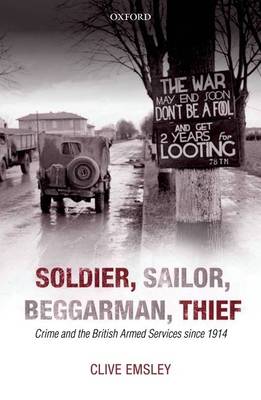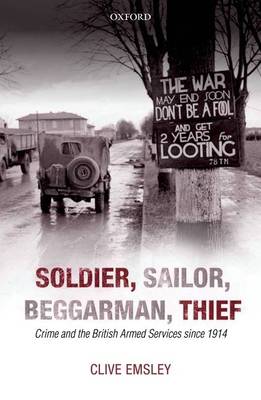
- Afhalen na 1 uur in een winkel met voorraad
- Gratis thuislevering in België vanaf € 30
- Ruim aanbod met 7 miljoen producten
- Afhalen na 1 uur in een winkel met voorraad
- Gratis thuislevering in België vanaf € 30
- Ruim aanbod met 7 miljoen producten
Zoeken
Soldier, Sailor, Beggarman, Thief
Crime and the British Armed Services Since 1914
Clive Emsley
Hardcover | Engels
€ 216,95
+ 433 punten
Omschrijving
The belief that crime declines at the beginning of major wars, as young men are drawn into the armed forces, and increases with the restoration of peace, as brutalised veterans are released on to a labour market reorganising for peace, has a long pedigree in Britain. But it has rarely been examined critically and scarcely at all for the period of the two world wars of the twentieth century. This is the first serious investigation of criminal offending by members of the British armed forces both during and immediately after these wars. Its particular focus is the two world wars but, recognising the concerns and the problems voiced in recent years about veterans of the Falklands, the Gulf wars, and the campaign in Afghanistan, Clive Emsley concludes his narrative in the present.
Specificaties
Betrokkenen
- Auteur(s):
- Uitgeverij:
Inhoud
- Aantal bladzijden:
- 240
- Taal:
- Engels
Eigenschappen
- Productcode (EAN):
- 9780199653713
- Verschijningsdatum:
- 14/03/2013
- Uitvoering:
- Hardcover
- Formaat:
- Genaaid
- Afmetingen:
- 163 mm x 236 mm
- Gewicht:
- 521 g

Alleen bij Standaard Boekhandel
+ 433 punten op je klantenkaart van Standaard Boekhandel
Beoordelingen
We publiceren alleen reviews die voldoen aan de voorwaarden voor reviews. Bekijk onze voorwaarden voor reviews.







